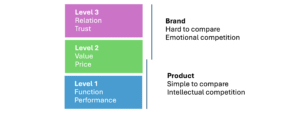Comparability is not positive when you want to sell a premium product. The trick is to move from intellectual competition to more emotional.
A product is tangible and possible to describe. It can be a physical product or a service that fulfills the needs and wants of organizations and their stakeholders. A brand is a colorful collection of thoughts, feelings, and opinions that channel into both conscious and unconscious expectations of the product.
Products can be described intellectually and compared rationally, whereas brands consist of mental associations that are significantly more difficult to describe and compare.
We often simplify this fact by reasoning that all products – from a new soft drink over logistics services to nuclear power plants – can be broken down into three parts as shown in the figure below:
Level 1: Function and Performance
Every product has a specific function and performance. For example, a transport service may run between Malmö and Stockholm according to a certain timetable and have a guaranteed delivery time.
Level 2: Price
All products also have a price. Up to this point, you as the seller control everything – you decide on the function, performance and price.
Level 3: Perceived value
But when the potential customer considers your product, he/she sees it from the outside and assigns a value to it. Beyond function and performance, this value includes elements like trust, reliability, relationship, etc.

Far too many companies forget step 3 of this equation. Any salesperson who complains that the price is too high to close the deal has completely misunderstood the relationship between price and value. Moreover, by focusing on function, performance and price, the salesperson exposes themselves to what we call intellectual competition. The offering can quite simply be compared to competitors’, and there will always be another company that can outdo the seller’s offering in at least some aspect.
Companies that instead focus on value – that is, the customer-perceived benefit of the offering – and on building trust and strong customer relationships are instead moving into what we call emotional competition. This means, in short, that other brands will have a significantly harder time to offer an alternative that the buyer truly perceives as “more valuable” – because “value” is a complex and subjective judgment that is attributed to the brand the buyer likes the most.
That being said, function, performance, and price are not irrelevant – they are always necessary in B2B contexts. However, they are often overrated, particularly in industries where the actual differences in product performance (and price) are so marginal that the buyer doesn’t perceive them as relevant. When dealing with market-leading companies and mature products, the buyer often concludes that the quality is good enough and that the price is on a relevant level mirroring this.
Do you want to know more about how to win new premium customers, just reach out to ulf.vanselius@comprend.com
